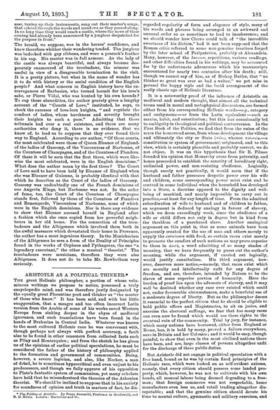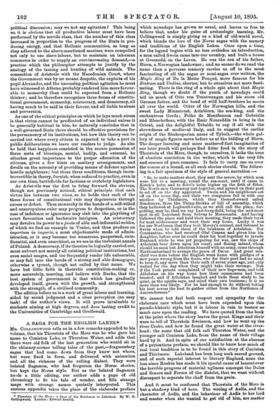ARISTOTLE AS A POLITICAL THINKER.*
THE great Hellenic philosopher, a portion of whose volu- minous writings we propose to notice, possessed a truly encyclopmffic mind, and was therefore justly designated by the equally great Florentine poet and thinker as "the master of those who know." It has been said, and with but little exaggeration, that a meagre and too often incorrect Latin version from the Arabia of some of his works saved Western Europe from sinking deeper in the abyss of medimval ignorance, and such translations have been found in the hands of Brahmins in Central India. Whatever was known to the most cultured Hellenic race he was conversant with, though perhaps not always with perfect accuracy, a fault also to be found in other reasoners from collected facts such as Pliny and Montesquieu ; and from the sketch he has given us of the opinions of earlier political speculations, he must be considered the father of the history of philosophy applied to the formation and government of communities. Being, however, a severe logician, and also, like Necker, a man of detail, he is sometimes hypercritical and even unjust to his predecessors, and though we fully approve of his opposition to Plato's fantastic system of communism, yet many scholars have held that he misunderstood the theories of the Athenian theorist. We should be inclined to suppose that in his anxiety for soundness of opinion and truth in matters of fact, he dis-- • Ths Politics of Arista. By Franz filnsemflii, Professor in Greifswald, and B. D. Hicks, London: Macmillan and 00.
regarded regularity of form and elegance of style, many of his words and phrases being arranged in an awkward and unusual order so as sometimes to lead to incoherence; and we should wonder how Cicero could talk of "the incredible sweetness of his diction," had it not been supposed that the Roman critic referred to some non-genuine treatises forged by the later school of Peripatetics, probably at Alexandria. Many, however, of the lacunce, repetitions, various readings, and other difficulties found in his writings, may be accounted for by the unfortunate adventures which his manuscripts encountered for nearly two centuries after his death ; still, though we cannot say of him, as of Bishop Butler, that "no thinker so great was ever so bad a writer," we yet miss in perusal the happy style and the lucid arrangement of the really classic age of Hellenic literature.
It is a noteworthy proof of the influence of Aristotle on media3val and modern thought, that almost all the technical terms used in moral and metaphysical discussions, are formed either from his corresponding Hellenic words—e.g., category and enthymeme —or from the Latin equivalent —such as maxim, habit, and constitution ; but this has occasionally led to ambiguity in theological and political controversies. In the First Book of the Politics, we find that from the union of the sexes the homestead arose, from whose development the village and ultimately the city or State (irAq, whence Troxereke,—a constitution or system of government) originated, and to this view, which is certainly plausible and probably correct, we do not object. It was on this hypothesis that Sir R. Filmet founded his opinion that Monarchy arose from paternity, and hence proceeded to establish the sanctity of hereditary right, unlimited power, and non-resisting obedience. Logically, though surely not practically, it would seem that if the husband and father possesses despotic power over his wife and children, some corresponding power must exist and be centred in some individual when the household has developed into a State, a doctrine opposed to the dignity and well- being of mankind, and nearly impossible to carry out in practice,—at least for any length of time. From the admitted subordination of wife to husband and of children to father, an argument is deduced by analogy in favour of slavery, which we deem exceedingly weak, since the obedience of a wife or child differs not only in degree but in kind from the thraldom of a purchased slave. Another analogical argument on this point is, that as some animals have been apparently created for the use of man and others merely to supply the carnivore with food, so certain races exist merely to promote the comfort of such nations as may prove superior to them in elperi, a word admitting of so many shades of meaning, that we have frequently to guess out the author's meaning, while the argument, if carried out logically, would justify cannibalism. His third argument, how- ever, deserves more notice,—namely, that races exist which are morally and intellectually unfit for any degree of freedom, and are, therefore, intended by Nature to be the slaves of some superior portion of humanity. Here the burden of proof lies upon the advocate of slavery, and it may well be doubted whether any race ever existed which could not, under favourable circumstances, make a beneficial use of a moderate degree of liberty. But as the philosopher deems it essential to the perfect citizen that be should be eligible to hold public offices and Magistracies, to sit on juries, and exercise the electoral suffrage, we fear that too many races can even now be found which would use these rights to the eventual ruin of the community. Trial by jury, for instance, which many nations have borrowed, either from England or Rome, has, it is held by many, proved a failure everywhere, save in Britain and her Colonies ; and it would be easy, though painful, to show that even in the most civilised nations there have been, and are, large classes of persons altogether unfit for the discharge of these public duties.
But Aristotle did not engage in political speculation with a free hand, bound as he was by certain fixed principles of the Hellenic race, which were looked on as self-evident axioms, namely, that every citizen should possess some landed pro- perty, which, however, he was not to cultivate with his own hands, all manual labour being deemed degrading to a free- man; that foreign commerce was not respectable, home manufacture even less so, and retail trading altogether dis- reputable; and that the genuine citizen should devote his time to mental culture, gymnastic and military exercises, and
political discussion; may we not say agitation ? This being so, it is obvious that all productive labour must have been performed by the servile class, that the number of this class increased in proportion to the progress of the State in pro- ducing energy, and that Hellenic communities, as long as they adhered to the above-mentioned maxims, were compelled not only to use slave-labour, but to maintain an inhuman commerce in order to supply an ever-increasing demand,—a practice which the philosopher attempts to jastify by the analogy of the taming and hunting of wild animals. The connection of Aristotle with the Macedonian Court, where the Government was by no means despotic, the exploit. of his pupil Alexander, and the unceasing political agitation he must have witnessed at Athens, probably rendered him more favour- able to monarchy than could be expected from a Hellenic thinker ; and he therefore recognises three forms of constitu- tional government, monarchy, aristocracy, and democracy, all having much to be said in their favour, and all liable to abuse and perversion.
As one of the ethical principles on which he lays much stress is that virtue cannot be predicated of an individual unless it be generally habitual in him, he naturally concludes that in a well-governed State there should be effective provisions for the permanency of its institutions, but how this theory can be carried out where every citizen is expected to take a part in public deliberations we leave our readers to judge. As also he held that happiness consisted in the secure possession of three sorts of blessings, mental, bodily, and external, he attaches great importance to the proper education of the citizens, gives a few hints on sanitary arrangements, and dwells on the necessity of providing means of defence against hostile neighbours ; but these three conditions, though incon- trovertible in theory, furnish, when reduced to practice, even in our own time, battlefields for factions or crotchety legislators.
As Aristotle was the first to bring forward the obvious, though not previously noticed, ethical principle that each virtue lies between two vices, so he holds that each of the three forms of constitutional rule may degenerate through excess or defect. Thus monarchy in the hands of a self-willed and unscrupulous ruler may progress to despotism, or in the case of indolence or ignorance may sink into the plaything of court favourites and backstairs intrigues. An aristocracy may devolve its power to a junta of able and influential nobles, of which we find an example in Venice, and thus produce an imperium in iinperio, a most objectionable mode of admin- istration, or it may become too numerous, pauperised, unin- fittential, and even anarchical, as we see in the turbulent annals of Poland. A democracy, if its theories be logically carried out, must subvert not merely all existing political institutions, but even social usages, and too frequently render life unbearable, or may fall into the hands of a strong and able demagogue, otherwise a tyrant, though not called by that name. We have but little faith in theoretic constitution-making or, more accurately, marring, and believe with Burke, that the beat system of government is that which has gradually developed itself, grown with the growth, and strengthened with the strength, of a civilised community.
The edition before us is a work of great labour and learning, aided by sound judgment and a clear perception (no easy task) of the author's views. It will prove invaluable to students aiming at high degrees, and does lasting credit to the Universities of Cambridge and Greifswald.



































 Previous page
Previous page